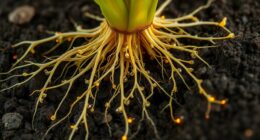To build strong connections as a chemist, start by leveraging your existing network to find collaboration opportunities and share resources. Attend industry events and engage actively on social media to expand your reach. Practice clear, concise communication and develop an engaging elevator pitch to showcase your expertise. Focus on nurturing genuine relationships through mutual support and follow-up. For more tips on establishing meaningful professional links, keep exploring strategies to strengthen your network.
Key Takeaways
- Leverage existing academic, industry, and research connections to access resources and explore collaboration opportunities.
- Actively participate in industry events, conferences, and online platforms to increase visibility and expand your network.
- Develop clear, concise communication skills and craft a compelling elevator pitch to effectively share your expertise.
- Build genuine, long-term relationships through trust, active listening, and offering mutual support within your network.
- Prepare for networking by researching attendees, customizing your approach, and utilizing industry insights to demonstrate relevance.
Recognize the Power of Your Existing Network

Your existing network is a valuable asset that often goes underappreciated. You likely have connections across academia, industry, and research institutions, each offering unique insights and opportunities. These relationships can give you access to shared facilities, cutting-edge technologies, and valuable resources that would otherwise be difficult to obtain. Your network can also open doors to new career opportunities through recommendations and referrals, helping you advance professionally. Furthermore, it facilitates knowledge sharing—exchanging best practices and innovative ideas across different fields of chemistry. Collaborations with your contacts can lead to interdisciplinary projects, boosting your research impact. Recognizing the importance of mammography in detecting breast cancer early highlights the value of early and effective communication about health risks. Recognizing the value of your current connections is the first step toward leveraging them effectively for growth, collaboration, and success in your chemistry career. Additionally, understanding the significance of essential oils in health and wellness can inspire collaborations that explore natural remedies and alternative medicine approaches within the scientific community. Building strong relationships can also expand your access to latest research, keeping you at the forefront of your field and fostering continuous learning and innovation. Moreover, fostering awareness of AI in Education can facilitate the integration of innovative teaching tools and research methodologies into your work, enhancing both learning and discovery. Being aware of regulatory changes in the field can help you stay compliant and adapt your research strategies accordingly.
Engage Actively at Industry Events and Conferences

Building on the importance of recognizing your current network, actively participating in industry events and conferences can substantially expand your professional reach. Seek out relevant events like those hosted by the American Chemistry Council, ACS, or the Society of Cosmetic Chemists, tailored to your specialization. Engage by participating in workshops, panels, and roundtable discussions to increase visibility. Attend dedicated networking sessions and social gatherings to connect informally with peers. Respectfully ask questions during presentations to demonstrate interest and spark conversations. Prepare a clear elevator pitch to introduce yourself confidently. Use social media to connect beforehand and follow up afterward with new contacts. Incorporate vertical storage solutions into your conference materials or booth to showcase your knowledge of organization techniques. Additionally, understanding Nissan tuning concepts can help you relate to technical discussions and establish credibility in your field. Recognizing the importance of a balanced diet, including juice cleanses, can also enhance your overall energy and focus during these professional engagements. Staying aware of retail store hours can help you plan your attendance and avoid missing key events. Developing a good understanding of bedroom design principles can also help you create a comfortable and inviting environment for networking breaks or informal meetings during conferences.
Develop Clear and Concise Communication Skills

Effective communication is crucial for conveying complex chemical concepts clearly and efficiently. To do this, you should develop strong technical writing skills by practicing structured, precise reports, proposals, and manuscripts.
Public speaking is equally important; rehearse presentations and lab talks to improve brevity and adapt to your audience. Active listening helps guarantee you accurately interpret technical discussions; paraphrasing and asking clarifying questions are key.
Additionally, create visual aids like concise slides and infographics to simplify intricate ideas. Seek feedback from peers or mentors to identify jargon or ambiguities.
Mastering these skills enhances your ability to share ideas effectively, build credibility, and foster collaboration. Clear, concise communication is an indispensable tool for networking and advancing your career in chemistry.
Cultivate Genuine Relationships Through Mutual Support

Fostering genuine relationships through mutual support is vital for creating a strong professional network in chemistry. You build trust by establishing reliability and actively listening to others’ needs. Show empathy and understanding to deepen bonds, and align with shared values and goals to strengthen connections. Utilizing predictive modeling can help identify opportunities for collaboration and support among colleagues. Offer assistance, share resources, and participate in collaborative projects to promote reciprocal support. Providing constructive feedback and celebrating successes foster positivity and trust. Recognizing patterns of emotional manipulation can help prevent exploitation and maintain healthy interactions within your network. Developing an awareness of trust-building strategies can further enhance the resilience of your professional relationships. Creating an environment of psychological safety is essential—encourage open communication, protect colleagues from overload, and offer emotional support during tough times. Maintaining awareness of divorce statistics can help you understand the importance of supportive connections during life transitions. Developing a culture of supportive interactions can promote a more inclusive and collaborative environment. Keep in mind that fostering transparency and consistency in your communication also plays a crucial role in strengthening these bonds. Maintain respectful interactions to uphold trust and safety. Developing long-term connections requires regular contact, shared experiences, and a commitment to continuous learning. Engaging actively in networking events also enhances these relationships, making your network resilient and supportive.
Leverage Online Platforms and Social Media Effectively

Leveraging online platforms and social media can substantially expand your professional network beyond face-to-face interactions. With over 71% of healthcare professionals active on social media, you have a valuable opportunity to connect with peers, share research, and stay updated.
Platforms like LinkedIn, YouTube, and Facebook are popular among professionals and can be effective for chemists too. Creating or joining chemistry-focused groups enhances collaboration and visibility. Sharing quality content—such as articles, videos, or infographics—can boost engagement and establish your credibility. Incorporating visual presentation skills can further improve the impact of your online content and make your posts more engaging.
Leverage LinkedIn, YouTube, and Facebook to connect, share, and boost your chemistry profile online.
Using social media to promote webinars or conferences increases reach and participation. Participating in online forums or hosting virtual events helps you build relationships globally. User consent management is essential when sharing content, ensuring compliance with privacy policies and maintaining trust. Engaging with multimedia elements like high-quality images or videos can significantly improve your content’s effectiveness and viewer retention.
Understanding the importance of color accuracy and how calibration improves it can make your online presentations more professional and visually appealing. Consistent, interactive posting keeps your network engaged and positions you as an active member of the chemistry community. Incorporating content sharing strategies can further enhance your online engagement and professional growth.
Prepare Strategically for Networking Opportunities

Preparing strategically for networking opportunities starts with crafting a clear and compelling elevator pitch. Focus on a 30-second, 90-word summary that highlights your expertise, career interests, and unique value. Emphasize specific chemistry specialties like analytical or medicinal chemistry, and include relevant industry trends such as green chemistry or drug discovery. Rehearse to deliver it confidently and clearly, ensuring it sounds natural. Additionally, optimizing your professional branding materials—creating detailed business cards, incorporating QR codes linking to your digital portfolio, and maintaining consistent branding across all platforms—can significantly enhance your presentation. Research event attendees and agendas beforehand, identifying key individuals and sessions. Finally, dress appropriately, prepare conversation starters, and organize tools like notebooks and digital devices to maximize your networking impact. Incorporating celebrity lifestyle insights can also serve as an engaging way to break the ice and build rapport with new contacts. Being aware of potential pitfalls in adopting new payment technologies can help you discuss innovative solutions with peers interested in industry advancements.
Nurture Long-Term Connections for Sustainable Growth

Building long-term connections requires intentional effort and strategic engagement across multiple platforms. Attend industry events, local gatherings, and participate in community projects to diversify your network. Use online platforms like LinkedIn and ResearchGate to broaden your reach, and leverage alumni networks for shared experiences.
Foster meaningful conversations by actively listening, sharing insights, and encouraging feedback. Follow up regularly to maintain rapport. Building trust takes consistency, reliability, and transparency—demonstrate expertise and offer mentorship to establish credibility.
Utilize technology by staying active on social media, engaging in forums, and holding virtual meetings to sustain relationships. Continuous professional development through workshops, memberships, and collaborative research helps deepen bonds.
Prioritize ongoing engagement to ensure your network supports your growth and long-term success.
Frequently Asked Questions
How Can I Identify Hidden Networking Opportunities Within My Current Contacts?
To find hidden networking opportunities within your current contacts, start by auditing your relationships—look for colleagues involved in cross-functional projects, research collaborations, or mentorship programs.
Explore their connections on platforms like LinkedIn or ResearchGate, and analyze their activity for engagement hints.
Reconnect through knowledge-sharing sessions or joint projects, and leverage internal resources like innovation challenges or employee resource groups to uncover new collaboration avenues.
What Are the Best Ways to Follow up Without Seeming Pushy?
When you follow up, keep it friendly and respectful of their time. Send a brief message within 24–48 hours, referencing your last conversation.
If no reply, wait 7 days before reaching out again, mentioning your previous discussion.
Use polite language, offer value, and avoid multiple follow-ups. Limit your attempts to 2–3, and always acknowledge their busy schedule.
This way, you stay engaged without seeming pushy.
How Do I Handle Rejection or Lack of Responses Professionally?
Rejection is common, with clinical labs rejecting up to 2% of specimens; don’t take it personally. When responses lack, stay professional by politely following up once or twice, showing genuine interest.
Use a calm tone, and reframe rejection as an opportunity to improve your approach, much like refining lab processes. Persistence, patience, and maintaining professionalism will help you build resilience and keep doors open for future opportunities.
How Can I Balance Networking Efforts With Daily Research or Work Commitments?
Balancing networking with your daily research or work commitments means scheduling dedicated time for both, so neither gets neglected.
You should prioritize high-impact activities using tools like the Eisenhower Matrix and set specific times for networking, like during lunch or after hours.
Be flexible to seize unexpected opportunities, and leverage online platforms or brief meetings to maximize efficiency.
What Are Effective Ways to Keep Long-Term Contacts Engaged Over Time?
To keep your long-term contacts engaged, you should stay consistent with communication, like scheduling regular check-ins or sharing updates on your work.
Show genuine interest by commenting on their projects or research.
Collaborate on projects or attend industry events together to strengthen bonds.
Offering valuable advice and staying active on social media also helps maintain relationships.
Conclusion
So, don’t forget—your most valuable network might just be the one you already have. While you chase the latest conferences and online trends, those genuine relationships rooted in mutual support often go unnoticed. Ironically, building connections isn’t about grand gestures but consistent, authentic engagement. Keep nurturing your network, and you might find that the key to your success was right there all along—hidden in plain sight.









